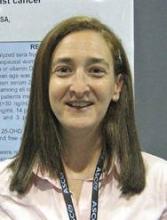SAN ANTONIO – Curbing colony-stimulating factor use at the start of dose-dense chemotherapy in Medicare patients with hormone receptor–positive breast cancer would save nearly $40 million per year in a population unlikely to gain meaningful benefit from such therapy, according to a new study.
The use of first-cycle colony-stimulating factor (CSF) therapy took off in 2002, Dr. Dawn L. Hershman told attendees at the San Antonio Breast Cancer Symposium. That was the year the benefits of dose-dense chemotherapy were reported, and pegfilgrastim (Neulasta), a granulocyte CSF that was easier to use than those previously available, received marketing approval from the Food and Drug Administration.
A new analysis of Medicare data shows that first-cycle use of CSFs in patients with stage I-III breast cancer jumped from 13% during 1998-2002 to 68% in 2002-2005, reported Dr. Hershman of Columbia University, New York.
In the last half-decade, however, multiple major studies have convincingly shown that the benefits of dose-dense chemotherapy with first-cycle CSFs are confined to breast cancer patients with hormone receptor–negative tumors, according to Dr. Hershman.
For example, one meta-analysis of studies comparing dose-dense to standard chemotherapy in 3,337 estrogen receptor–negative patients showed that dose-dense chemotherapy yielded a 29% reduction in recurrence risk and a 16% improvement in overall survival. In 1,344 estrogen receptor–positive patients, in contrast, dose-dense chemotherapy provided a nonsignificant 8% reduction in recurrence risk and no hint of a benefit in terms of overall survival (J. Natl. Cancer Inst. 2010;102:1845-54).
For the new study, Dr. Hershman and her coauthors identified 10,773 patients in a combined Surveillance, Epidemiology, and End Results (SEER)-Medicare database who were over age 65 with stage I-III breast cancer diagnosed during 1998-2005, and who had at least one chemotherapy claim within 6 months of diagnosis. Of these, 5,266 had a CSF claim during therapy. First-cycle CSF use increased from 13% to 68% over the study period, and the use of pegfilgrastim jumped from 4% to 84%.
"We’re very quick in oncology to adopt, and we never pull back – even when there’s evidence against," Dr. Hershman said. "If we have to make decisions in terms of controlling costs, we shouldn’t be giving drugs that are costly and have no benefit."
Dr. Thomas J. Smith, chair of the session at which Dr. Hershman presented the new study, took the argument further, citing Dr. Hershman’s own earlier study suggesting that CSF therapy in elderly women may actually cause significant harm. In an analysis in which she merged Medicare and SEER databases, Dr. Hershman had reported a twofold increased risk of acute myeloid leukemia and myelodysplastic syndrome in elderly women who received a CSF compared with those who did not (J. Natl. Cancer Inst. 2007;99:196-205).
"All that nearly $40 million per year in Medicare expenditures for colony-stimulating factors is buying is toxicity. You’re not buying any disease benefit," argued Dr. Smith, director of palliative care and Harry J. Duffey Family Professor of Palliative Care at Johns Hopkins University, Baltimore.
He proposed that it’s time to consider putting the use of CSFs and dose-dense chemotherapy in elderly patients with hormone receptor–positive tumors on the Quality Oncology Practice Initiative's "do not use" list.
"My thought would be at a minimum we should explain the very small, at-most 8% relative benefit, and the risks. And most people, I think, given the numbers, would say, ‘I’ll take regular chemotherapy, thank you,’ " Dr. Smith predicted.
Dr. Hershman declared having no financial conflicts.


